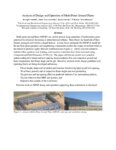TO
Filters: Collection: "ir_eua"
| Title | Date | Subject | Description | ||
|---|---|---|---|---|---|
| 76 |
 |
System for recovering viscous petroleum from thick tar sand | 1977-04-26 | viscous petroleum recovery; thick tar sand; patent | Recovery of viscous petroleum such as from thick tar sands is assisted using a closed-loop flow path formed in a well by concentric casing and tubular members extending from the earth's surface through a substantial portion of the formation for conducting hot fluid to reduce the viscosity of the pet... |
| 77 |
 |
1916-17 General Catalog | 1916 | University of Utah catalogue; (Catalog) | Catalog of the University of Utah. Announcements for 1916-1917. School of Arts and Sciences, School of Education, State School of Mines, School of Medicine, School of Law, Extension Division and Summer School. With List of Students during 1914-1915, and 1915-1916 |
| 78 |
 |
The implementation of composite computer mapping 1972 | 1972 | Composite computer mapping (CCM) is the name assigned to a recently developed technique to enhance the quality of decision making in the administration of aid to economic development. The name accurately implies a combination of two techniques (composite mapping and computer mapping) which have be... | |
| 79 |
 |
Flare combustion index in lieu of combustion zone net heating value | 2020 | Flares are commonly used at industrial facilities (e.g., oil and gas extraction and production sites, gas processing plants, oil refineries, and petrochemical manufacturing plants) to safely dispose of process waste gases. Waste gases may be produced due to process upset or because they are unrecove... | |
| 80 |
 |
Metallopetroporphyrines as process indicators: Separation of petroporpyrins in Green River oil shale pyrolysis products | 1994-11 | product oils; LLNL hot-recycled-solids; HRS retorting process; metallopetroporphyrins; process indicators; petroporpyrins; Green River oil shale pyrolysis | Product oils from the LLNL Hot-Recycled-Solids (HRS) retorting process were separated to isolate and concentrate the metallopetroporphyrins. A modified column chromatography procedure developed previously for heavy crude oils and tar sand bitumens was used. The fractions were then examined by UV-vis... |
| 81 |
 |
Analysis of design and operation of multi-point ground flares | 2022 | Multi-point ground flares (MPGF) are used to process large quantities of hydrocarbon gases generated in chemical processing or petrochemical refining. These flares use hundreds of flare burners arranged and fired in a staged fashion. A wind fence surrounds the MPGF to shield the flames from plant op... | |
| 82 |
 |
Lithologic logs and correlation of coreholes P. R. Spring and Hill Creek oil-impregnated standstone deposits Uintah County, Utah | 1975-08 | lithologic logs; correlation of coreholes; P. R. Spring; Hill Creek; oil-impregnated sandstone deposits; Utah | This report of investigation presents the lithologic logs and correlation of 16 coreholes drilled in 1973 in the P. R. Spring and Hill Creek oil-impregnated sandstone deposits, southeast Uintah County, Utah. The program was conducted under Grant No. GO 122094 from the U. S. Department of the Interio... |
| 83 |
 |
Clean and secure energy from domestic oil shale and oil sands resources: Quarterly progress report - April 2013-June 2013 | 2013 | domestic oil sands; domestic oil shale; ICSE; unconventional fuels development; life-cycle analysis | The Clean and Secure Energy from Domestic Oil Shale and Oil Sands Resources program, part of the research agenda of the Institute for Clean and Secure Energy (ICSE) at the University of Utah, is focused on engineering, scientific, and legal research surrounding the development of these resources in ... |
| 84 |
 |
Lawrence Livermore National Laboratory oil shale (Nov 1987) | 1987-11 | oil shale; oil shale retorting system; water generation; pyrolysis of oil shales; water formation | I. Water Generation During Fischer Assay Pyrolysis of Oil Shales. II. Mixing Requirements of Solid-Recycle Oil Shale Retorting System. |
| 85 |
 |
Lawrence Livermore National Laboratory oil shale project (Oct 1986) | 1986-10 | chemical reaction modeling; carbonate decomposition; oil shale; retorting process | I. Carbonate Decomposition Reaction Scheme and Kinetics. II. Chemical Reaction Modeling. |
| 86 |
 |
Plant starts, Athabasca now yielding its hydrocarbons | 1967-10-23 | synthetic crude; Athabasca oil sands; crude; strip mining | First synthetic crude from the Athabasca oil sands region of northeastern Alberta will reach the Toledo, Ohio, refinery of Sun Oil Co. in November. It will be an excellent grade of crude - high in gravity, free of sulfur and nitrogen. But nonetheless, it will have a strange background. Instead of be... |
| 87 |
 |
Fast-tracking Wasatch Front transit investments: economic and demographic impacts of a 2025 build-out | 2011 | Over the next 30 years, the Wasatch Front will significantly expand its transit network. Plans include the construction of an additional 25 miles of light rail, 76 miles of commuter rail, 227 miles of bus rapid transit, and 29 miles of mountain transportation rail line. These projects will be built ... | |
| 88 |
 |
Oxidized oil shale for removal of nitrogen oxides in combustion gas streams | 1993-01-15 | oxidized oil shale; hot recycled solids; HRS; oil shale retorting; removing nitrogen oxides | Oxidized oil shale from the combustor in the LLNL Hot-Recycled-Solids (HRS) oil shale retorting process has been found to be catalyst for removing nitrogen oxides from laboratory gas streams using NH3 as a reductant. Oxidized Green River oil shale heated at 10°C/min in an Ar/02/NO/NH3 mixture (~ 93... |
| 89 |
 |
1912-13 General Catalog | 1912 | University of Utah catalogue; (Catalog) | Catalogue of the University of Utah. Announcements for 1912-1913. School of Arts and Sciences, School of Education, State School of Mines, and School of Medicine. With Catalogue of Students 1911-1912 |
| 90 |
 |
1913-14 General Catalog | 1913 | University of Utah catalogue; (Catalog) | Catalogue of the University of Utah. Announcements for 1913-1914. School of Arts and Sciences, School of Education, State School of Mines, School of Medicine, and School of Law. With Catalogue of Students of 1912-1913 |
| 91 |
 |
Study contract for comparison of Utah and Athabasca oil sands | 1978-07 | air flux; oil production; oil recovery; in-situ test pattern; test patterns | |
| 92 |
 |
The implementation of composite computer mapping for the four corners regional commission 1971 | 1971-12 | Composite computer mapping (CCM) is the name assigned to a recently developed technique to enhance the quality of decision making in the administration of aid to economic development. The name accurately implies a combination of two techniques which have been used with varying effectiveness for m... | |
| 93 |
 |
Oil Shale Process Model (OSP) user's manual | 1995-01-05 | Oil Shale Process model; OSP; 4TU-Pilot; Hot-Recycled-Solids; HRS; Lawrence Livermore National Laboratory | The Oil Shale Process (OSP) model has proven to be a useful tool for the analysis of the steady-state operation of Lawrence Livermore National Laboratory's Hot-Recycled- Solids 4 tonne-per-day Pilot Retort (4TU-Pilot). This manual is being developed to serve as a guide to users of the OSP model. The... |
| 94 |
 |
Clean and secure energy from domestic oil shale and oil sands resources: Quarterly progress report - July 2014-September 2014 | 2014 | domestic oil shale; domestic oil sands; ICSE; utilization of oil shale and oil sands resources with CO2 management; liquid fuel production; in-situ thermal processing of oil shale; shale oil and pyrolysis products | The Clean and Secure Energy from Domestic Oil Shale and Oil Sands Resources program, part of the research agenda of the Institute for Clean and Secure Energy (ICSE) at the University of Utah, is focused on engineering, scientific, and legal research surrounding the development of these resources in ... |
| 95 |
 |
Low-temperature oil shale and tar sand extraction process | 1978-12-19 | low-temperature oil shale; low-temperature tar sand; extraction process; kerogen materials; crushed oil-shale; dekerosing; kerogen removal | Fertilizers and kerogen materials are extracted from crushed oil shale utilizing a low temperature dekerosing (kerogen removal) solvent phase followed by a second fertilizer extraction phase using water as solvent. Process control factors are effective in producing delamination of the crushed oil sh... |
| 96 |
 |
Oil recovery from a Utah tar sand deposit by in situ combustion | 1978-06-06 | The U. S. tar sand resource consists of an estimated 30 billion barrels (4.7Gm^3 ) of oil. Most of this resource is in six large deposits in Utah. Through research and development to prove tar sand oil recovery methods, the Department of Energy is attempting to stimulate commercialization of this re... | |
| 97 |
 |
Production of pure carbon dioxide | 1954-01-12 | production of pure carbon dioxide; pure carbon dioxide; oxidizable carbonaceous material; free of nitrogen; solid oxidizing agents; metallic oxides. | This invention relates to the production of pure carbon dioxide from oxidizable carbonaceous material, and particularly to the production of carbon dioxide free of inert gases, such as nitrogen. More particularly, the invention is concerned with the oxidation of carbonaceous material by means of sol... |
| 98 |
 |
Asphalt from Utah tar sands -- A JWBA project sponsored by the U.S. Department of Energy | 1989 | asphalt; Utah tar sands; JWBA project; asphalt production | JWBA has initiated a project for development of Utah's tar sands for production of specification-grade asphalt. Projected prices and costs strongly indicate economic viability within the market limitations. JWBA has licensed the water extraction technology developed at the University of Utah and has... |
| 99 |
 |
Chapter 18 | |||
| 100 |
 |
Development of CFD-based simulation tools for in situ thermal processing of oil shale/sands | 2012-02 | CFD; in situ; in situ thermal processing; oil shale; oil sands | In our research, we are taking the novel approach of developing and applying high performance computing, computational fluid dynamics (CFD)-based simulation tools to a modified in-situ process for production of oil from oil shale. The simulation tools being developed capture the relevant physical pr... |
